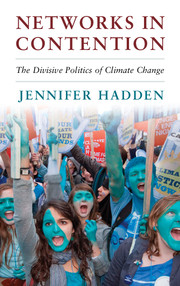Book contents
- Frontmatter
- Dedication
- Contents
- List of Figures
- List of Tables
- Acknowledgments
- Introduction
- 1 The Copenhagen Moment
- 2 The Emergence of a Divided Civil Society Network
- 3 A Network Approach to Collective Action
- 4 Conventional Climate Advocacy
- 5 Climate Justice Activism
- 6 Implications for Climate Change Politics
- Conclusion
- Main Abbreviations Used
- Methods Appendix
- References
- Index
- Books in the Series
1 - The Copenhagen Moment
Published online by Cambridge University Press: 05 April 2015
- Frontmatter
- Dedication
- Contents
- List of Figures
- List of Tables
- Acknowledgments
- Introduction
- 1 The Copenhagen Moment
- 2 The Emergence of a Divided Civil Society Network
- 3 A Network Approach to Collective Action
- 4 Conventional Climate Advocacy
- 5 Climate Justice Activism
- 6 Implications for Climate Change Politics
- Conclusion
- Main Abbreviations Used
- Methods Appendix
- References
- Index
- Books in the Series
Summary
The UN Climate Change Conference in Copenhagen was the moment at which world leaders expected to develop a successor agreement to the Kyoto Protocol. The meeting attracted an enormous amount of attention in popular media and political debate. As the New York Times summarized:
The massive interest in the meeting seemed a measure of rising expectations that negotiators will find their way to some sort of agreement or set of agreements – even if it's short of a treaty – that will render the meeting a success.
“Within two weeks from Monday, governments must give their adequate response to the urgent challenge of climate change,” said the United Nations climate chief, Yvo de Boer, in a statement on Sunday. “Negotiators now have the clearest signal ever from world leaders to craft solid proposals to implement rapid action.”
(Zeller 2009)The growing salience of the issue attracted a large number of civil society organizations to the world of climate politics from 2007 to 2009. The population of groups involved in this issue expanded dramatically within a short period of time. But changes in the substance of the international negotiations also increased the diversity of organizations. Groups from a wide variety of issue backgrounds – including international development, women, youth, indigenous peoples, and the global justice movement – all began to refocus their work around the topic of climate change in advance of this meeting.
This chapter explains how the population of civil society groups working on climate change has expanded and diversified in response to changing political opportunities. I do this by linking the history of civil society participation to developments in international climate change politics in each major period of the negotiations between 1998 and 2012. I draw on institutional records and organizational interviews to document these connections. I show that the increased turbulence in international negotiations was echoed and amplified by disagreements and divisions among civil society groups.
- Type
- Chapter
- Information
- Networks in ContentionThe Divisive Politics of Climate Change, pp. 16 - 37Publisher: Cambridge University PressPrint publication year: 2015

